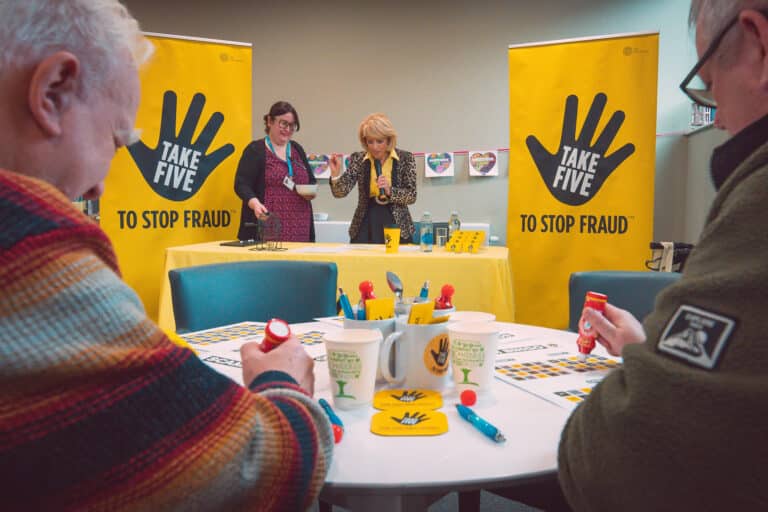UK Finance and Age UK have developed the game in response to new research which shows that 93 per cent of people in the North West say they are confident about spotting the signs of fraud, while only 27 per cent have heard of all the five most prevalent types of authorised push payment (APP) fraud. The survey showed that the average loss for a fraud victim in the UK is £1,381.
Take Five has thus developed the Scam Bingo game to help people learn about the most common types of fraud and scams. The game is available on the Take Five website and, as part of the campaign, Take Five has teamed up with Age UK to run bingo events at several local Age UKs across the country.
The new research also shows that almost two-thirds of people in the North West (63 per cent) say that they always check whether a request for money or personal information is legitimate before responding to the request. However, criminals continue to target this region.
For example, 38 per cent of people in the North West believe they have been approached with a purchase scam, when a criminal convinces someone to buy goods or services that don’t exist. Similarly, 33 per cent believe they have been approached with an investment scam and 34 per cent with an advanced fee scam, when a criminal convinces a person to pay an upfront fee in order to receive a prize, service, high-value goods or a loan which never materialises.
Almost a third (31 per cent) of people in the North West think they are most likely to be approached by a criminal via an email, and over a quarter (27 per cent) say it is most likely to be via social media.
In contrast, just 11 per cent say it is most likely a fraudster would contact them via a text message despite this being a common way for fraudsters to get in touch with potential victims.
Katy Worobec, managing director of economic crime at UK Finance said: “While our research shows over-65s say they are confident about spotting fraud and scams, it is crucial to understand the changing tactics criminals use to convince people they are legitimate.
“That is why we’ve created Scam Bingo to empower people to challenge all unexpected requests for their information – it’s a fun way to connect and learn how to protect ourselves from fraud and scams. It is important to remember the advice of the Take Five to Stop Fraud campaign and to stop and think when faced with requests for payment or personal and financial information.”
Sally Dervan, CEO of Age UK Manchester added: “The Scams Prevention work that Age UK Manchester has been involved in over recent months has given us the opportunity to raise awareness of scams with older people and their carers across the city. The Scam Bingo event is a great opportunity to deliver information in a friendly and entertaining way that will give older people knowledge of current scams, and enable them to better protect themselves against this growing area of risk.”
Event host Holderness knows only too well how convincing criminal scammers can be. Sue lost money when criminals hijacked her computer and pretended to be tech people who were helping her regain access.
She said: “Criminals are so sophisticated with the tricks they use to panic you into sharing personal details, which under normal circumstances you never would disclose to a stranger. Your bank or any other legitimate organisation won’t try to rush you into making decisions, so if you’re feeling pressured by someone, taking a moment to stop and think before parting with your money or information could keep you safe. Don’t feel embarrassed if you think you might have fallen for a scam, fraudsters can be incredibly convincing, but do protect yourself by contacting your bank immediately and reporting it to Action Fraud.”











